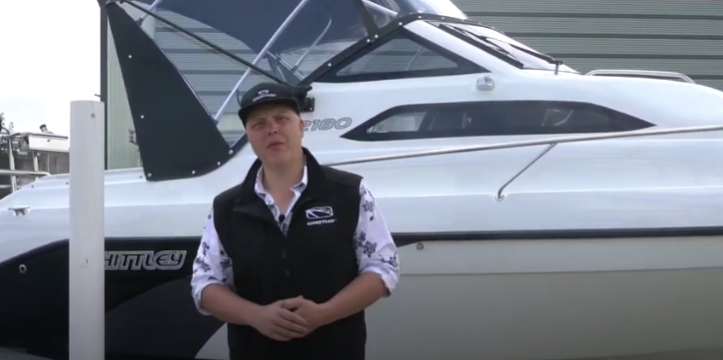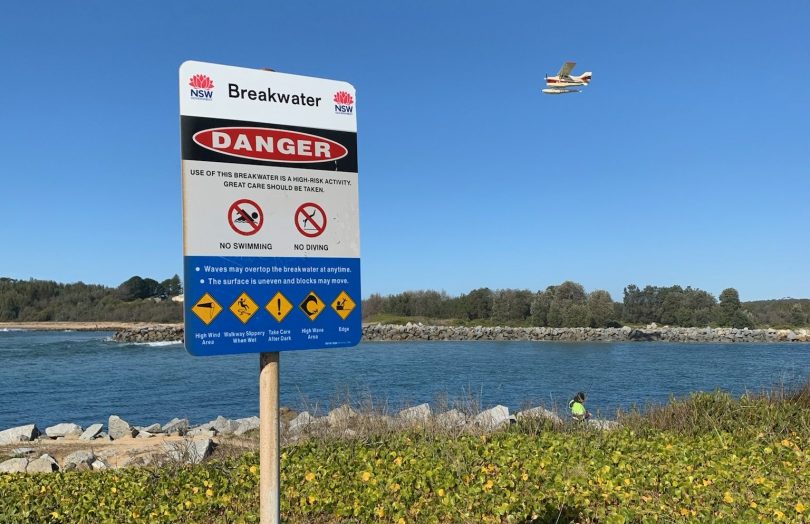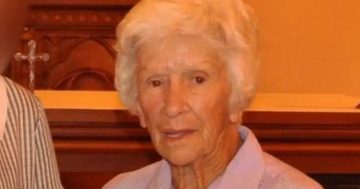
Alan Whittley has been cleared of the death of the 13-year-old girl. Photo: YouTube.
A member of Melbourne’s Whittley Marine boatbuilding family has been fully cleared of causing the death of a 13-year-old Canberra girl at Moruya in 2018.
When Judge Nicole Norman handed down her judgement in Sydney’s Downing Centre on Wednesday (23 June), she found skipper Alan Whittley had made the boat speed, which partly contributed to it capsizing, but his speeding did not amount to criminal negligence.
Judge Norman found him not guilty of a backup charge of negligent navigation causing death.
In May, a jury announced the 32-year-old was not guilty of the main charge he faced, causing death by culpably navigating in a dangerous manner.
The jury had heard that early in the morning of 24 March 2018, Mr Whittley had taken a 6.2-metre Whittley CR2080 fibreglass boat down the Moruya River towards the ocean.
Onboard for the fishing trip were the girl and her father, brother, friend and a friend of their family. No one was wearing a lifejacket.
The boat approached the Moruya River bar, which is where the Moruya River meets the ocean. They saw another boat ahead of them operated by people going fishing.
The girl’s father, who testified to the court, said when he saw the other boat successfully pass the bar, he encouraged Mr Whittley to keep driving.
He said they followed the wake of the other boat, but as they passed the end of the rock wall, a “rolling wave” headed straight towards them.
He said after they made it over the first wave, a second wave crashed over the roof of their boat and filled it with water. He told Mr Whittley to “gun it” and get them out of there, but when Mr Whittley accelerated the motor stalled. A third wave struck the boat and flipped it over.

The 13-year-old Canberra girl died at the Moruya River bar in March 2018. Photo: Kim Treasure.
Judge Norman said the 13-year-old died when she became trapped in the capsized boat.
“This is a tragic consequence and her death has no doubt caused inconsolable pain to her family and others,” she said.
At the start of the trial, Mr Whittley’s barrister Arthur Moses SC of New Chambers said the accident was caused by the combination of unexpected waves, along with a possible latent defect in the fuel filter of the boat’s Volvo Penta engine.
But Judge Norman rejected the idea the engine had stopped due to a defect, instead finding Mr Whittley had travelled too quickly into a wave at the bar which caused water to enter the boat and disable the engine.
This made the boat inoperable and it capsized, resulting in the death of the 13-year-old
“The operation of the vessel was a substantial cause of her death,” Judge Norman said.
“However, the defendant’s conduct in momentarily utilising excessive speed did not involve an unreasonable incurring of risk, and this error was not a departure from the standard of care that may be expected in all the circumstances.
“The conduct did not amount to negligence.”
She said while Mr Whittley claimed he did not use excessive speed at the bar, expert witnesses testified he had done so.
She rejected his account and accepted that excessive speed was the reason the boat became vertical before it capsized.
Judge Norman said the only time Mr Whittley checked the conditions for boating was when he looked at the weather the evening before they set out.
“Weather forecasts are known to change and be updated,” she said.
She said his mobile phone was on the boat with them so he could have made more online checks before setting off or while on the water. He also did not know the tide times.
“Undertaking these inquiries would have provided the defendant with forewarning of the conditions,” she said.
Judge Norman said he had failed to ensure everyone on board was wearing a lifejacket, a “well-understood safety requirement”.
But she also said it was unlikely a lifejacket would have saved the girl’s life.
“I accept it is likely it would have hindered her ability to exit the cabin of the vessel due to the buoyancy of the jacket,” she said.
While the conditions on the bar were rough that morning, she said it could also be navigated safely. For instance, the fishers in the boat ahead of Mr Whittley’s vessel managed to pass the bar successfully.
She also said following another boat’s wake did not meet safety requirements.
Judge Norman said Mr Whittley had claimed he observed conditions on the bar and it was “reasonably possible” he had made adequate observations.













